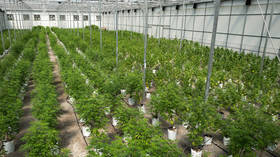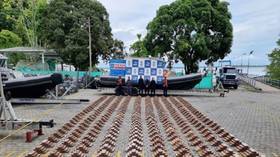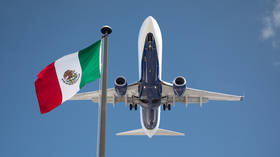Nearly 1,000 arrested in largest-ever UK organized crime bust

British police arrested nearly 1,000 people last month and confiscated hundreds of millions of pounds in drugs and cash in the UK’s largest-ever crackdown on organized crime, authorities revealed on Thursday.
Described by the BBC as the “most significant” law enforcement initiative of its kind, Operation Mille netted 180,000 cannabis plants, potentially worth £130 million ($167 million) and 20kg of cocaine worth as much as £1 million in a month of coordinated raids across England and Wales. Police also confiscated 20 guns, 40 other offensive weapons, and £636,000 in cash from targets.
Some 11,000 members of all 43 local and regional police forces in the two countries collaborated with the National Crime Agency and Immigration Enforcement on the raids, serving more than 1,000 warrants at suspected cannabis growing operations.
Of the 967 people arrested during the sweep, over 450 had been charged as of Sunday, Sky News reported.
The strategy was aimed at disrupting organized crime groups by taking out major revenue sources, nabbing key players, and learning how criminal networks operate, said Steve Jupp, the National Police Chiefs’ Council lead for Serious and Organized Crime. He told the BBC that Operation Mille’s goal was much more significant than putting a dent in local cannabis production.
While admitting trade in the drug was often considered “low-level,” he argued its cultivation on a large scale was a proven source of income to organized crime networks, with participants “complicit in wider offending which blights our communities.”
“We know that organized networks involved in cannabis production are also directly linked to an array of other serious criminality such as Class A drug importation, modern slavery and wider violence and exploitation,” Jupp said.
Of particular concern is the exploitation of young people in so-called county lines networks, which use kids as young as 12 who have been lured out of school with offers of fast cash and trinkets to deliver drugs to customers in rural areas.
Children are used based on the belief they are unlikely to face serious punishment even if caught with illegal substances. More than 2,000 such gangs are believed to exist in the UK, employing 27,000 youths in selling and transporting drugs.
In 2020, UK police arrested more than 700 suspects and seized £54 million in cash and tons of drugs after intelligence agencies in Europe hacked into EncroChat, an encryption format that was at the time ubiquitous among criminal organizations involved in drugs, weapons, and people smuggling into the UK. EncroPhones were used by 10,000 people in the UK alone and 60,000 worldwide who believed their communications to be secure from eavesdropping.













